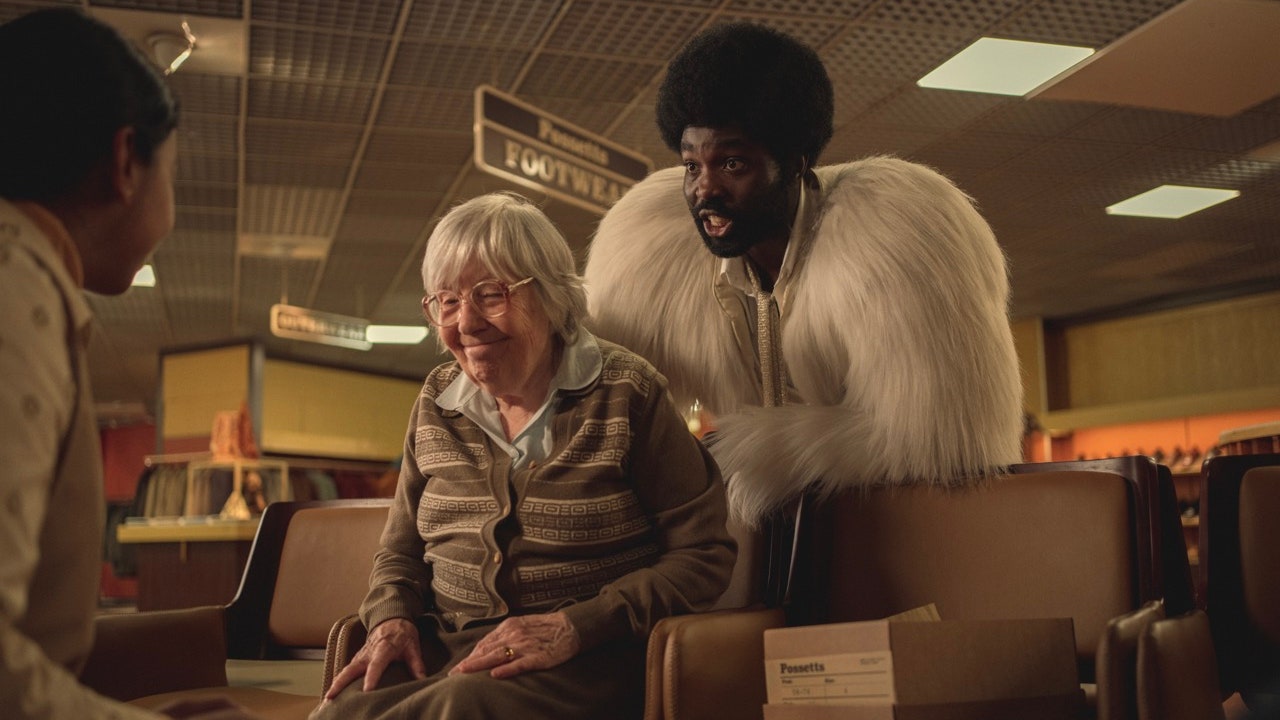The following article contains spoilers for Black Mirror season 6, episode 5, “Demon 79.”
Looking back on it, it's easy to forget how endearingly economical the earliest Black Mirror episodes were, feeling as though they were held together with bits of string and a dream. On the one hand, that imbued even Charlie Brooker's most disquieting dystopias with a sort of restrained realism: think of the set of “Fifteen Million Merits”, a sparse, clinical labyrinth of greyscale gyms and cells entombed by giant screens. The best stories, too, dealt with the personal ramifications of absurd, high-stakes premises. Then there was Brooker's uniquely British wit: “The National Anthem” was funny because it dealt with the fictional PM shagging a pig, to the glee of the Twitterati, serving as a gratifying bit of wish-fulfilment in our politician-averse age.
Netflix money and ever-grander ambitions, nevertheless, have given us some of the best Black Mirror episodes. Think of “San Junipero”, everyone's favourite gal-lovin' uplifter, with its atypically hopeful vision of a techno-future where romance never dies. At the same time, one is sometimes left wanting for a return to the low-fi Black Mirror of years gone by, that provocatively technophobic, twisty Twilight Zone laced with Brooker's signature raininess.
Perhaps it's strange that this season's “Demon 79,” which deals not with rogue technology but the supernatural — a marked departure by any metric — feels such a prototypical return to roots, but it's welcomely familiar, with its UK TV cast, dark humour and budget aesthetic. It's also the best episode of the show in years.
As the title suggests, the episode is set in 1979 England, with all the ails of the moment: the Thatcher-fuelled Tories are rocketing to office, torrid racism is being stoked by the bully boys of the National Front, and then there's the ever-burgeoning threat of nuclear disaster. ("How did anyone survive the Cold War without constantly lapsing into existential terror," seems to be one of Brooker's timelier questions.) In one sense, this is historical dressing for an episode that stylistically homages the video nasties of the 1970s and ‘80s, imbuing it with the feel of a lost horror flick re-discovered in an attic rummage. More pertinently, the nastiness in the air gives Anjana Vasan’s Nida, an Indian shoe saleswoman surrounded by xenophobes, a lot to worry about.
Such is the psychological torment of living in a country which hates you, Nida occasionally lapses into satisfyingly violent fantasies. The racist cow who makes Nida eat her biryani in the shop basement, because it “smells”? Of course she deserves her face being smashed into a glass-shredded pulp. Meek and unassuming so she is, she'd never dream of actually meting out such justice. That's until an ancient talisman she finds in a drawer starts talking to her, from which emerges the fabulously caustic disco demon Gaap (Paapa Essiedu). His hellish appearance is too much to take for human eyes, so he wears the look of Boney M's lead singer, with his coiffed afro and swishy party pants, like Studio 54 drag. Gaap presents Nida with a simple ultimatum: kill three people over the next three days, or the world will ignite with atomic hellfire. It's happened to all of us at some point.
And so she bludgeons to death a series of men that Gaap promises her are nasty, evil types. (The first fella regularly sexually assaults his young daughter; the second is a lecherous creep who murdered his wife; the third… wrong place, wrong time. Eh!). Enriched both by devilishly funny scripting from Brooker and co-writer Bisha K. Ali — among the more darkly comic reveals is that this, serial skull-bashing to prevent the extinction of humanity, is basically just demon work experience — “Demon 79” gets brilliant mileage out of what is, really, a buddy comedy conceit inflected with the macabre. It also serves as another platform for Essiedu's chameleonic acting abilities. As Gaap, he delivers his lines with cig-craving exasperation, utterly bemused that humans care so much about murder. Between this and his riveting parts in The Capture, I May Destroy You and The Lazarus Project, he's not only showing himself to be one hell of a talent but one with exciting range.
“Demon 79”'s climax and dénouement find the dark pessimism of old episodes meshing surprisingly well with the sunnier outlook of nü-Black Mirror. There's an unmistakable bit of “San Junipero” in there, Nida and Gaap finding some solace in one another — even if their respective worlds are intolerably awful to them — with the bleaker overtones of a “White Christmas,” the planet facing greater consequences than our unlikely duo. That the episode indeed ends with thermonuclear holocaust is both signposted clearly from the beginning (one of few marks against it), and an endpoint which could be taken as ambiguous: there's little to suggest that we're not once again in one of Nida's elaborate, waking dreams, as she metes out fantastical justice on the world that rejected her. And perhaps she's right. When the state of things are this bad, maybe what we need is a grand reset.
Black Mirror is now streaming on Netflix.


